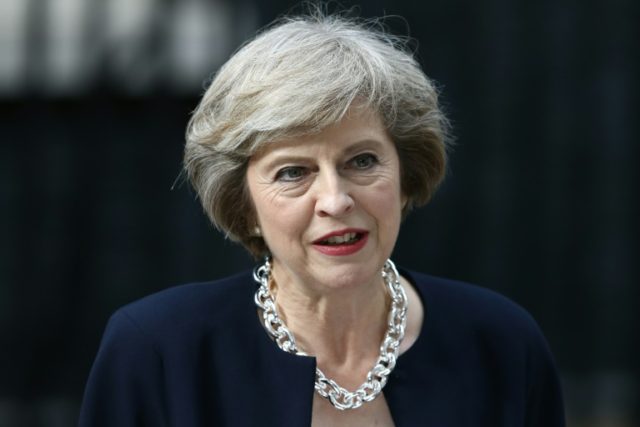London (AFP) – Prime Minister Theresa May took the first step towards Brexit on Wednesday by giving up Britain’s presidency of the European Council, ahead of her first meeting with German Chancellor Angela Merkel.
Britain will no longer assume the six-month rotating presidency next July as planned, choosing instead to prioritise negotiations on implementing last month’s shock referendum vote to leave the European Union (EU).
Estonia’s turn, which had been due to start in January 2018, is set to be brought forward by six months to take Britain’s place, a spokesman for EU president Donald Tusk said after the announcement.
The move came just hours before May, who took office only a week ago as Britain’s first female leader since Margaret Thatcher stepped down, makes her first foreign trip with a visit to Berlin to meet Merkel.
Following a working dinner with the German chancellor she travels to Paris on Thursday for talks with French President Francois Hollande in a bid to forge a personal relationship with two leaders who will play a key role in developing Britain’s new EU ties.
May is set to repeat her call for patience as her new government maps its strategy for ending its 43-year-old membership with the bloc.
“I am determined that Britain will make a success of leaving the European Union and that’s why I have decided to visit Berlin and Paris so soon after taking office,” May said in a statement.
“I do not underestimate the challenge of negotiating our exit from the EU and I firmly believe that being able to talk frankly and openly about the issues we face will be an important part of a successful negotiation.
“I also want to deliver a very clear message about the importance we attach to our bilateral relationship with our European partners, not just now but also when we have left the EU.”
Key sticking points in the Brexit negotiations could be freedom of movement and the timetable for triggering Article 50 of the Lisbon Treaty, which starts the two-year countdown to Britain’s formal departure.
May avoided detail on these questions in a confident performance in her first parliamentary question session on Wednesday — a time-honoured ritual seen as a test of British political leadership.
She also mocked the opposition Labour and Liberal Democrat parties and dodged criticism about past undiplomatic comments made by her choice for foreign minister — top Brexit campaigner Boris Johnson.
Several commentators heard echoes of Thatcher in her barbed comments, with the Independent daily commenting that she was “eerily reminiscent” of the late so-called Iron Lady.
– ‘Build bridges’ –
May is likely to have an easier ride with Merkel than with France’s Socialist leader, although both have their own domestic election cycles to think about.
“May has to build bridges with her fellow leaders,” Professor Iain Begg, from the European Institute at the London School of Economics, told AFP.
“It will be getting to know each other, combined with trying to put positions on the table.
“May has this reputation as a tough negotiator who says what she wants and wants what she says. She will be anxious to convey that she’s not a soft touch.”
Commentators have drawn comparisons between Merkel and May: both pastors’ daughters with low-profile husbands, no children and a love of Alpine hiking, who rose to become leaders of centre-right parties.
While some EU countries want Britain out of the bloc as soon as possible, the German leader has called for patience.
However, she has also warned that Britain cannot have continued access to the single market while restricting the freedom of EU citizens to emigrate to Britain — the key issue in the June 23 referendum.
Hollande has a presidential election looming in April and is coming under pressure from the far-right National Front, which wants France to leave the EU too.
“For Hollande there is manifestly a concern about Brexit contagion to France,” said Begg.
“He will want to impress upon May that she cannot string this along indefinitely or expect great gifts from France because Hollande has domestic politics to think about and he will want to avoid ‘encourager les autres’ (encouraging others).”

COMMENTS
Please let us know if you're having issues with commenting.